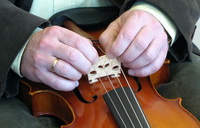
If your bridge leans towards to the fingerboard, you should straighten it as soon as possible.
VIOLIN & VIOLA:
- As you can see in the picture, the best way to move the bridge is to first sit down and place your instrument between your thighs. The tailpiece should be closest to you. Then hold the top of the bridge with your thumbs and index fingers, and press your forearms to your body.  Pull the bridge slowly towards you but don’t release the forearm pressure during this movement.
Pull the bridge slowly towards you but don’t release the forearm pressure during this movement.
- Be aware that the bridge resistance may be quite different with various instruments. If you lubricate the string grooves by graphite, you can expect much less force will be necessary.
- You can of course push the bridge in the opposite direction if needed, but always ensure that your arms and hands are in the correct position.
- Never move the bridge too far. It is better to repeat the procedure again, if the initial correction isn't sufficient.
If you have any doubts, consult your luthier.
CELLO:
- Correcting the bridge position under the full pressure of strings is not easy and may be quite dangerous to the instrument and strings. We recommend that you loosen the tension of the strings by at least about half. Then you can  move the bridge towards to tailpiece.
move the bridge towards to tailpiece.
- Always use the position demonstrated in the picture. Place your cello with the tailpiece facing you and press your forearms to the instrument. Pull the bridge towards you slowly, but don't release the forearm pressure during the movement. In other words, pull the bridge under constant pressure of your forearms to the instrument.
- Be aware that the bridge resistance may be quite different with various instruments. If you lubricate the string grooves by graphite, you can expect much less force will be necessary.
- You can of course push the bridge in the opposite direction if needed, but always ensure that your arms and hands are in the correct position.
- You should aim for a slightly slanted position (towards to tailpiece) when the strings are not fully tuned. Tuning the strings to their correct tension will move the bridge to the correct position.
- Never move the bridge too far. It is better to repeat the procedure again, if the initial correction isn't sufficient.
If you have any doubts, consult your luthier.
